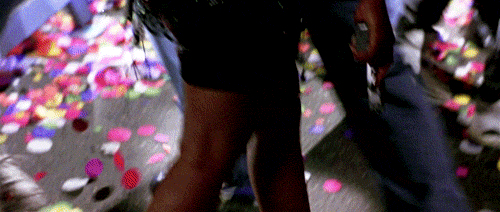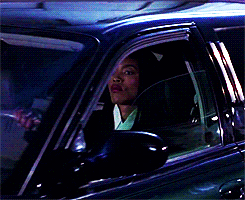Text
It’s great to see an empowering character like Mace, who despite her gender doesn’t allow emotions to become the basis of her character. While Mace has strong feelings for Lenny they aren’t reflected in her as a character, which normally happens to women in film as we see by Faith’s weakness during the hotel fight scene. While Mace is downstairs fighting for her life and potentially the life of the man she loves, Faith is in the hotel room cowering in the background because she’s “overcome with emotion”.
Strange Days (1995)
Jane Gaines’s essay “White Privilege and Looking Relations: Race and Gender in Feminist Film Theory” examined the erasure of black women in cinema by white male filmmakers. To fully understand this point, Gaines relies on the history of this topic. Specifically, she states, “If, as feminists have argued, women’s sexuality evokes an unconscious terror in men, then black women’s sexuality represents a special threat to white patriarchy; the possibility of its eruption stands for the aspirations of the black race as a whole” (p. 303). In the film, Strange Days (1995),there is a strong representation of black female empowerment shown in the character of Mace. Initially playing the role of a bodyguard, Mace transforms into a powerful action hero who is constantly saving Lenny from dire situations. In one particular scene, Mace is shown cocking a gun in her holster between her thighs, held under her little black dress. The purpose of this shot is to give Mace a masculine role while still keeping her femininity intact. Tying back to Gaines’s argument, the role of a black female in this film is not to be overlooked, but rather, shown as an independent, kick-ass character. Between the love that Mace has for Lenny and her desire to keep him safe, she is represented in all different lights.

32 notes
·
View notes
Text
It’s interesting that you brought up Mace never being played up as a love interest because of her race and I never thought about it until now. Throughout the entire film all the white women are hypersexualized and Lenny is still entranced by his ex-girlfriend Faith. However, it isn’t until the end when she saves the day that Mace’s character gets to elevate from friend to potential love interest.
Strange Days(1995)
Jane Gaines believes that when most film discusses female sexuality the attention is on white women. She goes even further to assert that the gaze is only on white female heterosexual women. This isolates a large portion of the audience who is not white nor heterosexual. By withholding characters that society can universally identify with a film narrows its reach. Gaines states “black women’s sexuality represents a special threat to white patriarchy; the possibility of its eruption stands for the aspirations of the black race as a whole” (p. 303) she is claiming that black women’s underrepresentation in film is due to the looming threat of their powerful presence and filmmakers resistance toward giving them a fair share of screen time. In Strange Days(1995) Mace’s character was not seen as a romantic love interest until the very last scene. Lenny was preoccupied with Faith and was not able to realize his feelings for Mace. The final scene shows Mace as a strong character and refrains from hypersexualization by giving her a heroic role that a man would normally take on. The image of the police officers beaten Mace shows that she gets no advantage for being a woman and is seen as an equal. In the end Lenny and Mace end up together which is unusual according to Gaines’ essay.

5 notes
·
View notes
Text
Strange Days (1995)
In her writing White Privilege and Looking Relations: Race and Gender in Feminist Film Theory , author Jane Gaines explains how film is particularly portrayed through a white male lens and depicts their images of pleasure for them all while built on heterosexual assumption. One aspect of Gaines’ writing is the idea of visual discrepancy in film particularly in the sense of how it is hard for these films to represent or depict race issues and not use them as a decorative piece. The film Strange Days (1995) directed by Kathryn Bigelow put racial injustice in the center of its storyline. As Gaines mentions in her text, this film similarly has racial conflict looming throughout it, which is evident from the very beginning when we see Jeriko One discusses the racial issues in their fictional city. Gaines discusses that race is usually played down to accommodate for the white audience. However, Bigelow does a great job of making racial pressure not only present but clear and realistic to the viewer. One seen the depicts this well is when Mace uses the SQUID to view the death of Jeriko One. As Jeriko is in the car and hears the police sirens he starts mentioning the common issue of being black in today’s world known as the crime of “walking while black.” Then, right before his death Jeriko tells police that the reason they’re angry is because he’s bringing up their inherent racism and he intends to make a song about the very incident, which results in him getting shot in the head. Other films may have just implied the racism or allowed Mace’s character to carry the burden and drag the narrative in racial injustice, however, in this film we see that race is on the mind and apparent to everyone.

0 notes
Link
Female directors got few opportunities in Hollywood films
15 notes
·
View notes
Link
6 Amazing Female Film Directors From Cinema History
13 notes
·
View notes
Link
64% of Female Screenwriters Report Harassment at Work
14 notes
·
View notes
Link
Penny Marshall's groundbreaking directing career
14 notes
·
View notes
Link
Women directors of Hollywood: ‘This discrimination is real’
14 notes
·
View notes
Link
Why Were There Fewer Top Female Movie Directors in 2018 Than In 2017?
14 notes
·
View notes
Link
‘The perception that cinematography is a man’s job is used as a tool to deny women opportunities’
15 notes
·
View notes
Link
You can direct a movie while pregnant. But Hollywood’s not going to make it easy.
17 notes
·
View notes
Link
How Moonlight Editor Joi McMillon's Oscar Nomination Made History
15 notes
·
View notes
Link
TIFF to spotlight underrepresented film critics, journalists
18 notes
·
View notes
Link
Hollywood Women Share How to Boost Representation
14 notes
·
View notes
Link
Diversity in Hollywood: Women still struggle
17 notes
·
View notes